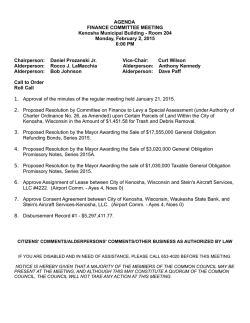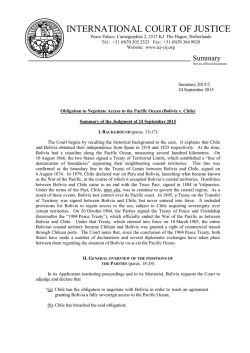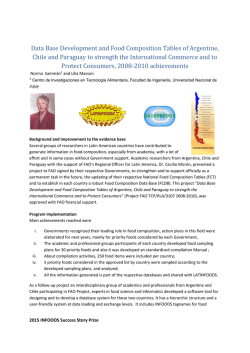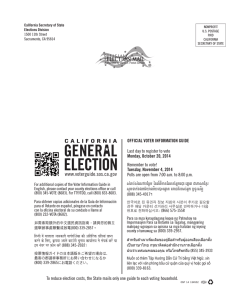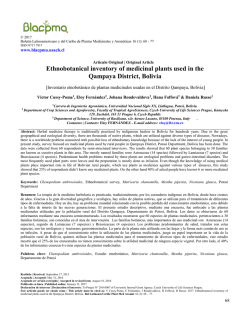
Preliminary objection of Chile does not possess an exclusively
DISSENTING OPINION OF JUDGE AD HOC ARBOUR Preliminary objection of Chile does not possess an exclusively preliminary character — Bolivia inconsistent as to the subject-matter — If Bolivia alleged obligation of result then Court’s jurisdiction would be precluded by Article VI of the Pact of Bogotá — Until merits argued, Court not in a position to accurately identify subject-matter — Question of jurisdiction should have been left to the merits. I. INTRODUCTION 1. With regret, and with the greatest respect, I disagree with the decision of the Court on the disposition of Chile’s preliminary objection to the jurisdiction of the Court. For the reasons set out below, I conclude that the objection does not possess an exclusively preliminary character, within the meaning of Article 79 (9) of the Rules of Court, and that its disposition should be reserved until after the case has been fully heard on the merits. II. BOLIVIA’S CHARACTERIZATION OF THE SUBJECT-MATTER OF THE DISPUTE 2. I turn first to the characterization of the subject-matter of the dispute. In that process, the Court must strive to “isolate the real issue in the case and to identify the object of the claim” (Nuclear Tests (Australia v. France), Judgment, I.C.J. Reports 1974, p. 262, para. 29; Nuclear Tests (New Zealand v. France), Judgment, I.C.J. Reports 1974, p. 466, para. 30). As the Court notes at paragraph 26 of the Judgment, this analysis should be based on the formulation of the dispute by the Applicant, taking into account the written and oral pleadings of the Parties. It is therefore useful to examine how Bolivia has characterized its claim, and how its position evolved throughout the course of the hearings. 3. Chile’s jurisdictional objection is based on its understanding that Bolivia is claiming that Chile has an obligation to grant it sovereign access to the Pacific through a negotiation process; as Chile understands it, this obligation would be one of result. Chile argues that sovereign access to the sea is the “ultimate object” of Bolivia’s claim, such that: “[t]he alleged obligation to negotiate is merely a means — indeed a notably artificial means ― articulated by Bolivia to seek to implement that alleged right. When one comes to the details of its claim, it is plain that, for Bolivia, negotiation is not the usual process of good faith exchanges, but rather a judicially prescribed procedure leading only to one predetermined outcome: that is, the grant to Bolivia of Chilean territory in order to obtain sovereign access to the sea.” (CR 2015/18, p. 47, para. 4 (Wordsworth).) 4. However, it has not always been clear in Bolivia’s pleadings whether it does in fact allege an obligation of result. Bolivia articulated the nature of its claim in several different ways. 5. Both Bolivia’s Application and its Memorial set out the subject-matter of the dispute as follows: “32. For the above reasons Bolivia respectfully requests the Court to adjudge and declare that: (a) Chile has the obligation to negotiate with Bolivia in order to reach an agreement granting Bolivia a fully sovereign access to the Pacific Ocean; (b) Chile has breached the said obligation; -2(c) Chile must perform the said obligation in good faith, promptly, formally, within a reasonable time and effectively, to grant Bolivia a fully sovereign access to the Pacific Ocean. 33. Bolivia reserves the right to supplement, modify and amplify the present Application in the course of the proceedings.” (Application of Bolivia, p. 20; see also Memorial of Bolivia, p. 10, para. 28.) 6. The following excerpts from Bolivia’s Memorial make unequivocal that what it seeks is for the Court to declare an obligation to negotiate to a particular result: “This section sets out the scope of Chile’s obligation to negotiate sovereign access to the sea. This obligation is more exacting than a general obligation to negotiate under international law. In particular, Chile is under an affirmative obligation to negotiate in good faith in order to achieve a particular result; namely, a sovereign access to the Pacific Ocean for Bolivia.” (Memorial of Bolivia, p. 97, para. 221.) 7. The Memorial underscores the distinction between an obligation of result and an obligation of means by relying on the advisory opinion in Nuclear Weapons. It notes that: “The Court declared that the effect of an obligation to negotiate in good faith can in certain circumstances be to create not only an obligation to negotiate but also an obligation to conclude an agreement. Analysing Article VI of the Treaty on the Non-proliferation of Nuclear Weapons, the Court declared that it sets out more than obligation of conduct: there is an obligation of result. ‘The legal import of that obligation ― the Court notes ― goes beyond that of a mere obligation of conduct; the obligation involved here is an obligation to achieve a precise result ― nuclear disarmament in all its aspects ― by adopting a particular course of conduct, namely, the pursuit of negotiations on the matter in good faith.’” (Legality of the Threat and Use of Nuclear Weapons, Advisory Opinion, I.C.J. Reports 1996, p. 263, para. 99.) ............................................................... Chile’s obligation to negotiate a sovereign access to the sea for Bolivia is of the same nature.” (Memorial of Bolivia, pp. 117-119, paras. 283-286.) 8. Bolivia draws a parallel with other obligations of result, such as under Article 125 of UNCLOS, explaining that “[t]he duty to reach a certain result by agreement plainly implies not merely a duty to negotiate, but a duty to negotiate in order to reach that agreement” (Memorial of Bolivia, p. 99, para. 226). It explains this further as follows: “Chile is under a more specific obligation to negotiate with Bolivia concerning sovereign access to the sea. It is not merely a matter of identifying and defining the scope of a dispute or disagreement between the two States: rather there is a legal obligation to pursue the realization of a defined objective by means of negotiations.” (Memorial of Bolivia, p. 104, para. 237.) 9. Bolivia notes that this obligation is permanent and continuing, able to be brought to an end only by a successful agreement: -3“The obligation to negotiate remains in force so long as the purpose of the obligation is not fulfilled ― a fortiori when, as in the present case, it is an obligation to negotiate in order to achieve a specific result.” (Memorial of Bolivia, p. 120, para. 290; see also p. 119, para. 287.) 10. The Memorial frequently refers to the alleged obligation as one “to negotiate a sovereign access to the sea”. But in the terms of the above this means not a mere obligation to negotiate, but an obligation to negotiate to achieve a certain result. Bolivia states that it is not asking the Court to define the “precise scope or modalities of the right to sovereign access to the sea”, instead, it is these modalities that will be the subject of the negotiations “in good faith to achieve the particular result of a sovereign access to the Pacific” for Bolivia (Memorial of Bolivia, p. 194, para. 497). But that result of sovereign access is not itself negotiable, it is an inherent part of the alleged obligation. 11. Although Bolivia’s Written Statement on the Preliminary Objection states that the subject-matter has to be identified by reference to its Application and Memorial, it does not explicitly refer to an obligation of result, stating only that the subject-matter is “the non-compliance by Chile with its obligation to negotiate in good faith a sovereign access for Bolivia to the Pacific Ocean, and its repudiation of that obligation” (Written Statement of Bolivia, p. 8, para. 21). 12. At the first round of oral hearings, Bolivia mainly used the language “obligation to negotiate”, seemingly continuing to refer to an obligation of result. Bolivia repeated its formulation from the Application, alleging that Chile had an obligation to negotiate in order to reach an agreement granting sovereign access (CR 2015/19, p. 18, para. 14 (Forteau); emphasis added). Professor Akhavan returned at the end of the first round to the idea of an obligation of result, noting that Bolivia was not requesting the Court to determine the specific modality of access, whether it be a corridor, coastal enclave, special zone, or some other practical solution; “Bolivia merely asks the Court that Chile honour its repeated agreement to negotiate such a solution” (CR 2015/19, p. 51, para. 3 (Akhavan)). 13. It was only during its second round of oral pleadings that Bolivia introduced some ambiguity in its position regarding the nature of Chile’s alleged obligation to negotiate. It suggested that the obligation was not “self-enforcing” and would not in itself result in Bolivia gaining sovereign access to the sea, rather it simply constituted an obligation to enter into negotiations with the aim of reaching an agreement on sovereign access (CR 2015/21, p. 18, para. 9 (Forteau)). Bolivia flatly rejected the assertion of Chile that “Bolivia is asking the Court to order Chile to renegotiate to change Bolivia’s non-sovereign access through Chilean territory into sovereign access” (CR 2015/21, p. 28, para. 11 (Remiro-Brotóns), emphasis by Remiro-Brotóns; citing CR 2015/20, p. 39 (Koh)). It quoted Gabčikovo-Nagymaros that it is not for the Court to impose a result for the negotiations and stated that it will be for the Parties to determine a practical solution (CR 2015/21, p. 32, para. 7 (Akhavan); citing Gabčikovo-Nagymaros Project (Hungary/Slovakia), Judgment, I.C.J. Reports 1997, p. 78, para. 141). 14. Finally, subsequent to the close of the oral rounds, both Parties responded in writing to a question asked by Judge Owada as to the meaning of the phrase “sovereign access to the sea”. Chile repeated its argument that Bolivia was effectively asking the Court to order that Chile was under an obligation to “transfer to Bolivia sovereignty over [Chile’s] coastal territory”. Bolivia’s answer is worth quoting directly because it is central to the Court’s reasoning in this case: “With regard to the relevance of this question to the jurisdiction of the Court, Bolivia observes that its case on the merits is that Chile has repeatedly agreed to negotiate Bolivia’s sovereign access to the Pacific Ocean to resolve the problem of its landlocked situation. To the extent that the meaning of that term and its specific content can be defined, it is necessary to determine the understanding of the parties in the successive agreements they have concluded. The existence and specific content of -4the parties’ agreement, Bolivia respectfully submits, is clearly not a matter for determination at the preliminary stage of proceedings, and must instead be determined at the merits stage of proceedings.” (Written reply of Bolivia to the question put by Judge Owada at the public sitting held on the afternoon of 8 May 2015.) 15. It is thus not clear whether Bolivia still maintains the position taken in its Memorial that the alleged obligation to negotiate is an obligation of result. In fact, Bolivia makes the point that the exact nature of the obligation cannot be determined until the merits have been heard, a point with which I agree, and it is for that reason that I would decline to pronounce on the jurisdictional issue until the case has been fully heard on the merits. However, as discussed below, the Court appears unconcerned with this ambiguity in articulating its finding about the subject-matter of the claim. III. THE COURT’S CHARACTERIZATION OF THE SUBJECT-MATTER 16. It is of course for the Court to determine the subject-matter of the case. Here, the Court concludes: “that the subject-matter of the dispute is whether Chile is obligated to negotiate in good faith Bolivia’s sovereign access to the Pacific Ocean, and, if such obligation exists, whether Chile has breached it” (Judgment, paragraph 34). 17. The Court states that: “the use in this Judgment of the phrases ‘sovereign access’ and ‘to negotiate sovereign access’ should not be understood as expressing any view by the Court about the existence, nature or content of any alleged obligation to negotiate on the part of Chile” (Judgment, paragraph 36). Yet the Court adds: “Even assuming arguendo that the Court were to find the existence of such an obligation, it would not be for the Court to predetermine the outcome of any negotiation that would take place in consequence of that obligation.” (Judgment, paragraph 33.) IV. EXCLUSIVELY PRELIMINARY CHARACTER OF THE OBJECTION 18. In my respectful view, until the case is heard on the merits and the Court is in a position to determine not only the existence of the alleged obligation to negotiate but also its true nature, content and scope, it is not possible to decide whether the real subject-matter in this case is a “matter . . . settled by arrangement between the parties or governed by agreements or by [the 1904 Peace] Treaty” before 1948, within the meaning of Article VI of the Pact of Bogotá. 19. It is only at the merits stage of the case that we will be in a position to determine whether the alleged obligation to negotiate, if it exists as a matter of international law, compels Chile to reach an accord with Bolivia granting it sovereign access to the Pacific Ocean ― on terms to be agreed upon ― or whether it merely compels the Parties to explore in good faith the feasibility as well as the modalities of that option. In my view, it is only in the latter case that Bolivia can avoid the application of Article VI of the Pact of Bogotá. 20. I turn now to a brief analysis of the relevant dispositions of the Pact of Bogotá to establish why that is so. 21. While Article XXXI confers jurisdiction on the Court “in all disputes of a juridical nature … concerning … any question of international law”, Article VI provides that this compulsory jurisdiction may not be applied to “matters already settled by arrangement between the -5parties … or which are governed by agreements or treaties in force on the date of the conclusion of the present Treaty”. 22. Chile relies on the comprehensive provisions of the 1904 Peace Treaty to argue that, properly understood, Bolivia’s claim deals with a matter settled or governed by that Treaty and is therefore not within the jurisdiction of the Court under Article VI of the Pact of Bogotá. The Court summarizes the applicable provision of the 1904 Peace Treaty at paragraph 40 of the Judgment and I agree with that summary. In short, the Treaty settles the territorial boundaries “absolutely and in perpetuity” between Bolivia and Chile, and grants Bolivia in perpetuity full and unrestricted commercial transit to its ports. 23. Having characterized the subject-matter of the disputes as it did, the Court concludes as follows: “The provisions of the 1904 Peace Treaty . . . do not expressly or impliedly address the question of Chile’s alleged obligation to negotiate Bolivia’s sovereign access to the Pacific Ocean. In the Court’s view, therefore, the matters in dispute are matters neither ‘settled by arrangement between the parties, or by arbitral award or by decision of an international court’ nor ‘governed by agreements or treaties in force on the date of the conclusion of the [Pact of Bogotá]’ within the meaning of Article VI of the Pact of Bogotá.” (Judgment, paragraph 50.) 24. With respect, this is a triumph of form over substance. At paragraph 32 of the Judgment, the Court draws a distinction between Bolivia’s end goal of sovereign access to the Pacific Ocean and “the related but distinct dispute presented by the Application, namely, whether Chile has an obligation to negotiate Bolivia’s sovereign access to the sea and, if such an obligation exists, whether Chile has breached it”. The Court focuses exclusively on the alleged existence of an obligation to negotiate ― the existence of which will of course have to be determined on the merits ― without explicitly addressing the alleged substantive content and scope of that obligation. While it is true that its Application “does not ask the Court to adjudge and declare that Bolivia has a right to sovereign access” (Judgment, paragraph 32), this is in effect what Bolivia requests in its Application and Memorial, if not in all its oral submissions, as I have explained above (paragraphs 5-15). 25. Indeed, should the Court find, on the merits, that Chile has an obligation to cede sovereignty over part of its territory to Bolivia, on terms to be negotiated (an obligation of result, as originally argued by Bolivia), this would, in my respectful view, fall squarely under Article VI of the Pact of Bogotá as “a matter . . . settled . . . or governed . . .” by the 1904 Peace Treaty. In such a case, this Court would have no jurisdiction to hear a dispute of a juridical nature relating to such a matter. If an obligation of that nature were found to exist, it would inevitably require modifications to the 1904 Peace Treaty, thereby confirming that the matter was governed by such Treaty and therefore excluded from the Court’s jurisdiction. 26. I am conscious that the Court may have largely avoided that difficulty in characterizing the subject-matter of the dispute as it did at paragraph 33 of the Judgment, which I quote again: “Even assuming arguendo that the Court were to find the existence of such an obligation [to negotiate sovereign access], it would not be for the Court to predetermine the outcome of any negotiation that would take place in consequence of that obligation.” -627. However, in my view this case falls squarely within the jurisprudence of the Court under Article 79 (9) of the Rules of Court, which requires the Court to defer its disposition of a preliminary objection if it either “does not have before it all facts necessary decide the questions raised or if answering the preliminary objection would determine the dispute, or some elements thereof, on the merits” (Territorial and Maritime Dispute (Nicaragua v. Colombia), Preliminary Objections, Judgment, I.C.J. Reports 2007 (II), p. 852, para. 51). 28. The issue at this stage of the proceedings is purely jurisdictional. Any treaty or agreement always implicitly leaves open the possibility for the parties to renegotiate its terms in the future. Put another way, no agreement could close in perpetuity the possibility of its revision. Therefore the real question is whether a party to the Pact of Bogotá purported to reopen a matter settled or governed by treaty or other agreement before 1948. I stress again that of course nothing ever prevents parties from attempting to renegotiate a matter settled or governed by the 1904 Peace Treaty. Should they do so, however, parties to the Pact of Bogotá may not benefit from the pre-agreed access to this Court under Article XXXI of the Pact in the event of a dispute occurring in the course of this reopening of settled matters. 29. Until the merits are fully argued, the Court is not in a position to identify the true nature, content and scope of the alleged obligation to negotiate, and whether it amounts to an obligation of result or an obligation of means. Only once this obligation has been defined can the Court determine whether it is a matter “settled” or “governed” by the 1904 Peace Treaty for the purposes of Article VI, and therefore whether it has jurisdiction. V. CONCLUSION 30. Because of the uncertainty about the true nature, content and scope of the alleged obligation to negotiate, which will only be resolved when the merits of the case is heard, in my view it is premature to decide whether the subject-matter of the dispute between the Parties deals with a matter falling within Article VI of the Pact of Bogotá. The proper disposition of Chile’s preliminary objection would be to postpone the decision until after the case has been fully heard on the merits. (Signed) ___________ Louise ARBOUR.
© Copyright 2026
